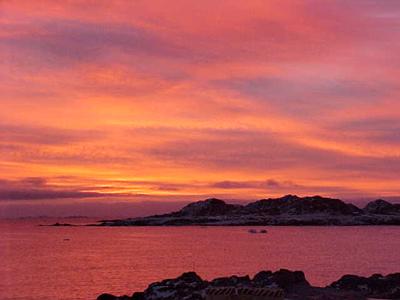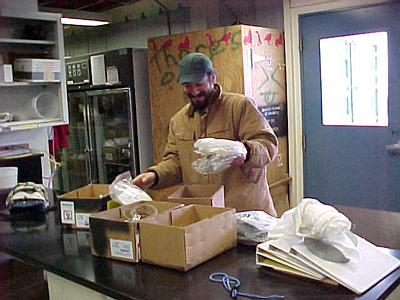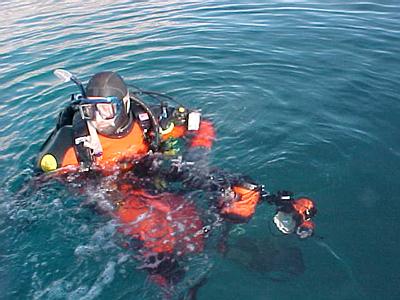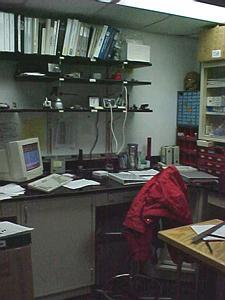29 March, 2000
Howie Tobin, Senior Lab Instrument Technician
Question 39: What is the Antarctic Treaty?
On our dive today we took along the underwater camera for the first time. We
will soon be using a digital video camera as well; hopefully underwater
pictures will be included in future journal entries. There were scattered
patches of clear sky today and the most beautiful sunset yet!
Howie Tobin is Palmer Station's Laboratory Instrument Technician. He is a
member of the support staff and is employed by Antarctic Support Associates
(ASA). He deals with the set-up, maintenance, upkeep, and break-down of all
the lab instruments used on the station. He assists science groups with their
lab needs, finding supplies, equipment, and facility space. He also keeps an
inventory of all the equipment, spare parts, etc. Keeping an accurate
inventory here is vital. If you don't know how many of something you have,
the station could run out unexpectedly. This is a problem when resupply from
the nearest store takes about a month to get here from the time the order is
placed.
The preparation for a science group begins well before it arrives. Howie
uses the group's SIP (Supporting Information Package) to put together all of
the equipment the science group has requested. The SIP for our project is an
eighty-eight page document that was filled out almost a year in advance. It
covers all science needs from equipment already at the station to the amount
of freezer space needed (and at what temperature), from equipment that will
have to be shipped in to the amount of air we will use for diving, from
minutely detailed chemicals to the number of station computers, and from field
radios and GPS units to the number of test tubes. At least we are not doing
field camp work out of McMurdo. Then we would also have to go into
nitty-gritty detail about all the things the group will need for living, up to
and including the amount of toilet paper!
Howie is also one of the four people on the meteorological team. Seven days
a week, every six hours, one of them observes, records and broadcasts the
area's weather. This is his first time on the ice. Previously he has done
environmental lab work with inorganic chemicals and trace metals. He has been
here since the end of October, five months. Next summer season he will be
here seven to eight months. After a month off, he will be working for
Raytheon (the company which takes over from ASA in April) at their Denver
office in science group communication putting SIPs together, ordering things
and dealing with vendors, manufacturers, and suppliers. He plans to continue
working in Antarctica.
One of the things that Howie likes about this job is the schedule. The
travel opportunities are very appealing. When you are finished with your time
on the ice, you are in South America, New Zealand or Australia with vacation
time. Another plus is the forced saving as there is not much to spend your
salary on here. However, working in Antarctica is very disruptive if there
are things that need your attention in the States. Once people have families
it becomes difficult to work here. There are very few people who have worked
on the ice for 10-12 years (for more numerical information about the people
here see the 5/5 journal).
Answer 38: No one. The Antarctic Treaty froze all territorial claims made on
the continent by other countries. Activity in Antarctica is governed by a
group of nations. Anyone who can get to Antarctica safely may go there.

Sunset over Torgersen and Litchfield Islands.

Howie Tobin packing up lab equipment after the science group using it has left.

Bill Baker preparing to dive with his underwater camera.

Howie's office space.

Contact the TEA in the field at
.
If you cannot connect through your browser, copy the
TEA's e-mail address in the "To:" line of
your favorite e-mail package.
|
